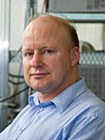ERC Advanced Grants for Maria Antonietta Loi and Bart van Wees
The European Research Council has awarded ERC Advanced Grants to two Zernike Institute members, Prof. Maria Antonietta Loi and Prof. Bart van Wees. They can use this money to set up long-term and ground-breaking research projects.
The European Research Council (ERC) awards grants to excellent researchers to stimulate groundbreaking research in Europe. The Advanced Grants are meant for established academics with a track-record of significant research achievements. Advanced Grants may be awarded up to €2,5 million for a period of 5 years.

Maria Antonietta Loi
Maria Antonietta Loi creates materials with specific structures on the nanometer scale (a nanometer is a millionth of a millimeter). The nanostructure determines the properties of the material, and Loi’s work is aimed first to understand how this happens, and then to create specific nanostructures for desired applications.
Her work is in opto-electronics, the interaction of materials with light. She has worked on new types of solar cells, based on perovskites, which are materials that have a very specific crystal structure, or on quantum dots, which are clusters of around 1,000 atoms that behave like one giant super-atom. These materials can receive light and act as solar cells or sensors, or emit light and be used as light emitting diodes (led’s).
In her ERC work she will create metamaterials (i.e. designed materials that do not occur in nature) that can be tuned to receive or emit light at specific wavelengths for different applications. Loi will combine quantum dots and quantum wells based on perovskites. The final objective is to produce new infrared photodetectors and visible light emitting diodes of superior performance levels.
See also:

Bart van Wees
Bart van Wees builds and studies nanodevices, electronic circuits with a core that consists of different layers of material, each just one atom thick. At this scale, the laws of quantum mechanics dominate. Van Wees works in a field called spintronics, which uses a quantum mechanical property of electrons, their ‘spin’. This can be best imagined by picturing electrons as small spheres spinning around their own axis. As spin is magnetic property, the spinning electrons are sensitive to magnetic fields.
This spin can assume two values: ‘up’ or ‘down’, which makes it suitable, in principle, for storing or transporting information. Van Wees creates 2D devices, often based on graphene (a form of carbon), to transport and manipulate spins. This already resulted in a ‘spin transistor’.
In his ERC project, Van Wees will work on so-called magnons. A magnon is a spin wave in non-conductive magnetic material. This is a disruption in the magnetization which spreads like a ‘wave’ in a full stadium: electrons in the material pass the spin on to their neighbours before falling back into their original position. With this form of transport only the spin moves, and the electrons do not travel around. This means heat does not develop and the transport requires very little energy.
The ERC project will open a regime that has not been explored before. Van Wees will study interactions between spins, magnons and phonons (a particle-like elastic excitation, also a quantum phenomenon) in 2D systems. Ultimately, this will provide new strategies for low power information technology including heat management.
See also:
| Last modified: | 26 April 2022 11.59 a.m. |
More news
-
29 April 2024
Tactile sensors
Every two weeks, UG Makers puts the spotlight on a researcher who has created something tangible, ranging from homemade measuring equipment for academic research to small or larger products that can change our daily lives. That is how UG...
-
16 April 2024
UG signs Barcelona Declaration on Open Research Information
In a significant stride toward advancing responsible research assessment and open science, the University of Groningen has officially signed the Barcelona Declaration on Open Research Information.
-
02 April 2024
Flying on wood dust
Every two weeks, UG Makers puts the spotlight on a researcher who has created something tangible, ranging from homemade measuring equipment for academic research to small or larger products that can change our daily lives. That is how UG...
